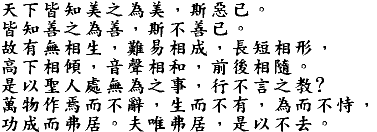MP3 Downloads
The audio recordings below are provided for your convenience. Please note that they are MP3 files extracted from YouTube videos, and the videos contain visual elements that cannot always be adequately conveyed through spoken words alone.
- Part 1: download from Google Drive
- Part 2: download from Google Drive
- Part 3: download from Google Drive
Paraphrase
Every concept gives rise to its complement. There can be no beauty without something that is less than beautiful, nor can there be goodness without something that is not so good.
When we observe the world, we notice such complements everywhere. Existence and nonexistence are two sides of the same coin; difficulty and ease are relative and constantly changing; descriptions like long and short, high and low have meaning only in comparison; music and voice harmonize and take on characteristics of one another. When we understand all of this, we begin to see that in life, being ahead or behind can be a matter of perspective.
This is why the sages live life in such an effective and joyous way. They manage their work without becoming fixated and overworking themselves; they demonstrate the Tao by setting examples for all to see.
They work with everything and everyone, without trying to be controlling of anything or anyone. They create good things in life, without trying to hold on to them in a possessive and proprietary way. They seek moderation in doing without overdoing, and excelling without excess. They attain their objectives, but once they have done so, they detach and move on to the next thing. This is the secret of their success, seemingly effortless… and continuous throughout life.
Thoughts & Reflections
Tao sages have long recognized the relative nature of the world. While one can certainly find absolutes in abstract theory, in the real world they rarely, if ever, exist. For instance, no metal is absolutely free of impurities. In fact, hardly anything in nature is absolutely pure. One can come close to 100% purity, but never quite get there.
It is the same with people. Absolute good and evil can exist as concepts, but will probably never be found among human beings. Everyone is a mixture of varying proportions. No person is any one thing.
If the world is by and large relative, then descriptions require comparison, perspective and proportion to have meaning. One can be short among professional basketball players and still be tall among kindergarten kids. Which description is correct? Both. Neither. It all depends.
The meaning of measurements arise from comparison, so “long” and “short” need each other. We can only describe an object as long if we’re comparing it against another similar object that is shorter. Each half of a complementary duality cannot exist without the other half. A descriptive concept creates its own opposite.
This applies not just to quantities, but qualities as well. For instance, “hard” and “easy” are concepts relative to one another. A task can only be “easy” if it is being compared to some other task that is relatively more difficult. If there’s nothing else to compare against, then the task cannot be rated in terms of difficulty.
Translation Notes
The characters 前後相隨 are not difficult to translate. A literal transcription would be “front / back / mutually / follow”, which can be rendered as “front and back follow each other.” If one prefers, one can use “ahead” or “before” instead of “front,” and “behind” or “after” instead of “back.”
Unfortunately, even an easy line like this can be distorted. One translation has “the coordination of first and last is endless” — but there is nothing in the original that says or implies “endless.” This element is a fabrication, forced in by a translator who lacks actual knowledge of Mandarin.
Another issue, more serious than the above, is the usage of “first and last.” The central concept in this chapter is that ahead and behind, like long and short, are meaningful only in relative comparisons with one another. “First” and “last” are absolute adjectives, not relative — so using them to translate, in this instance, completely obscures the original meaning.
- The Sad Lady - December 1, 2019
- Purchasing Yi - December 1, 2019
- The Seven Virtues of Water - August 21, 2018

